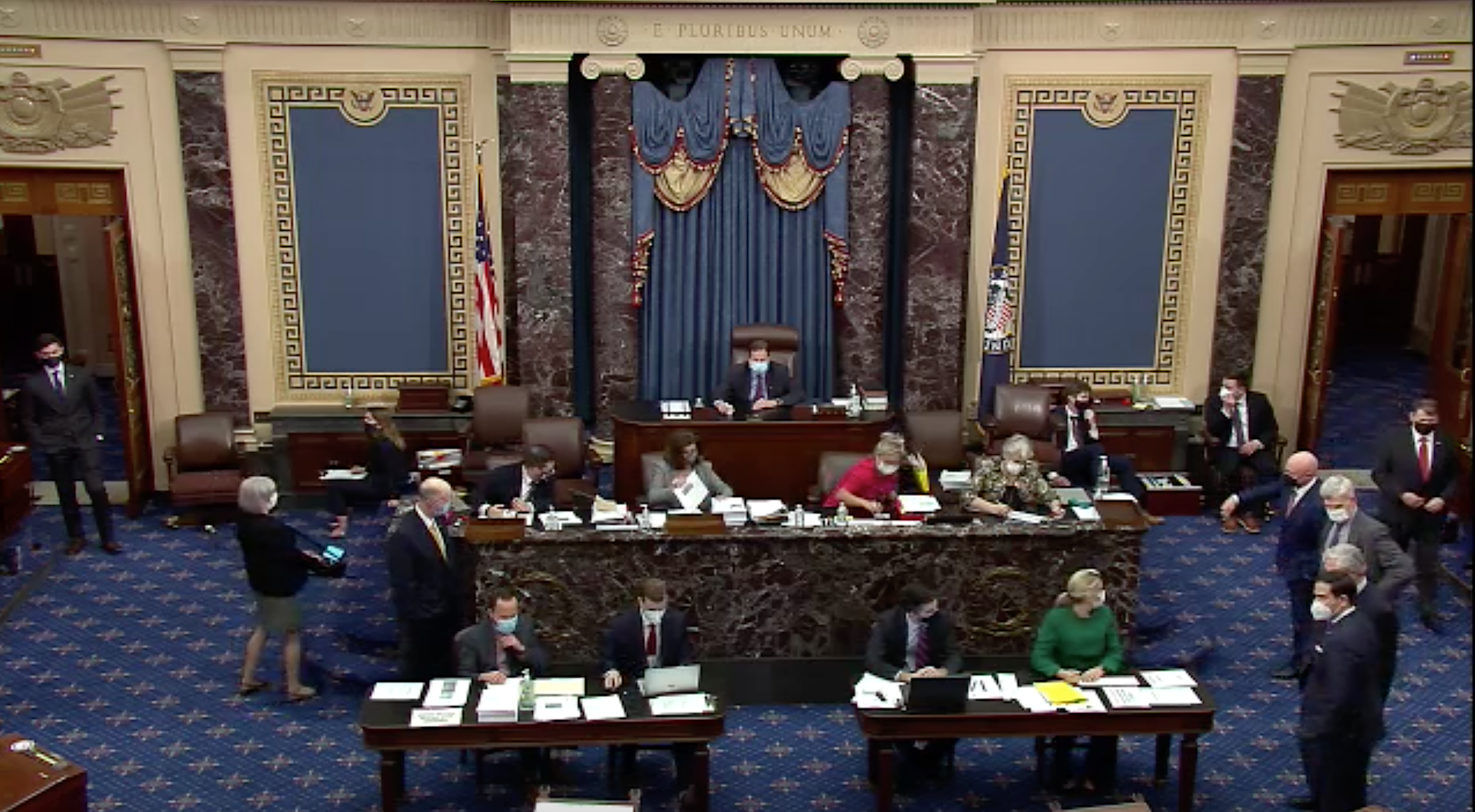
(GA Recorder) – The U.S. Senate passed President Joe Biden’s nearly $2 trillion stimulus plan Saturday afternoon after wrangling over an amendment to trim unemployment benefits derailed the bill’s passage for nearly an entire day.
The Senate version, which does not include a federal minimum wage hike and puts limits on the funding for state and local governments, will now make its way to the House for review. Democrats are rushing to pass the relief package so it reaches the president’s desk before the March 14 deadline for unemployment benefits expires to give states plenty of time to avoid missing those payments.
No Republicans voted for the House bill last week. The bill passed the Senate along party lines, 50-49. A tie-breaking vote from Vice President Kamala Harris was not needed because Sen. Dan Sullivan (R-Alaska) had to leave the Capitol after a family emergency.
Both Georgia U.S. Sens. Jon Ossoff and Raphael Warnock voted in favor of the bill and many supporters of the Biden administration proposal pointed to the state’s historic Senate runoff in January as paving the way for today’s narrow passage. They both campaigned on a promise to send direct payments to Americans, an idea their GOP opponents warmed to in the waning days of the campaign.
“This bill will deliver more help to more people than anything the federal government has done in decades,” Senate Majority Leader Sen. Charles Schumer said in a statement on passage of the bill.
House Majority Leader Rep. Steny Hoyer (D-Md.) said in a statement that the House would take up the bill on Tuesday.
The Senate version of the relief package earmarks $10 billion of the $350 billion in aid to states, local governments, territories, and tribes to go toward a state’s infrastructure projects such as improving broadband access. The Senate also set restrictions on how the money can be used, saying cities and states can’t use it to pay down pension costs or pay for new attempts to cut taxes.
The bill would provide $130 billion toward helping schools reopen, $14 billion for vaccine distribution, and billions more for childcare through a temporary expansion of the child tax credit. The bill also includes narrower eligibility for individual stimulus checks of $1,400, where individuals making $80,000 and joint tax filers at $160,000 would be phased out.
The Senate version provides for $300 weekly unemployment benefits — lower than the $400 a week in the House bill — through Sept. 6. It also makes the first $10,200 of unemployment insurance nontaxable for households with incomes under $150,000.
It was the unemployment benefits package that stalled the Senate on Friday. More than 400 amendments were introduced to the Senate version of the bill, but as lawmakers were preparing to vote on the first — Sen. Bernie Sanders’ (I-Vt.) proposal to increase the federal minimum wage — Sen. Joe Manchin (D-WVa.) raised objections to an unemployment amendment.
Sen. Tom Carper (D- Del.) had offered an amendment that kept federal unemployment benefits at the current $300 a week but extended the benefits through October and made the first $10,200 nontaxable.
A competing amendment from Sen. Rob Portman (R-Ohio) also kept benefits to $300 a week, but also cut off the extension in mid-July.
Both sides were attempting to win over Manchin, a moderate Democrat and a crucial swing vote in the 50-50 Senate.
Democrats struck a deal with Manchin after a nine-hour impasse, and passed the amendment 50-49 around 1:30 a.m. Saturday.
“The President has made it clear we will have enough vaccines for every American by the end of May and I am confident the economic recovery will follow,” Manchin said in a statement.
“The President supports the compromise agreement, and is grateful to all the Senators who worked so hard to reach this outcome,” White House Press Secretary Jen Psaki said in a statement after the deal. “ It extends supplemental unemployment benefit into September, and helps the vast majority of unemployment insurance recipients avoid unanticipated tax bills.”
Sen. Ben Cardin (D-Md.) told reporters on Capitol Hill Friday that it was unclear what the House will do.
“Will the House take it? I don’t have the answer to that,” he said.
Progressives in the House are already expressing disappointment that the Senate reduced unemployment benefits and stripped out a raise of the federal minimum wage.
“I’m frankly disgusted with some of my colleagues and question whether I can support this bill,” Rep. Bonnie Watson Coleman (D-N.J.) wrote in a tweet.
Sanders’ amendment to increase the federal minimum wage to $15 an hour over a five-year period was defeated 42 to 58. The House included the wage hike in its version even after the Senate parliamentarian ruled that including the provision violated procedural rules, which are being used to approve the stimulus package with a simple majority of 51 votes instead of the 60 typically required by the Senate filibuster.
The current federal minimum wage is $7.25 an hour, for an annual salary of about $15,000, and has not been raised since 2007.
“The result of that is half of our people are now living paycheck to paycheck and many in fact are working for wages that are much too low in order to take care of their families,” Sanders said.
Experts and researchers predict that a gradual increase in the federal minimum wage to $15 an hour would help lift nearly a million people out of poverty and benefit low-income workers across the country, particularly in the South.
Debate over the relief package was also delayed on Thursday by Sen. Ron Johnson (R-Wisc.) who required Senate clerks to read aloud the 628-page bill — a procedure that senators typically waive. Senate clerks started reading the bill Thursday at 3:20 p.m. and finished early Friday morning at 2:04 a.m.
Johnson told reporters on Capitol Hill Thursday that he planned to have members of his party submit hundreds of amendments to prevent Democrats from rushing to pass the bill in the hopes of wearing them down in order to trim the $1.9 trillion package.
“All I’m trying to do is make a more deliberative process on this abusive and obscene amount of money,” he said Thursday.
GOP Senators filed more than 400 amendments. Of those amendments, only three were adopted into the bill. Democrats introduced eight amendments, of which five were passed.
Georgia Recorder Editor in Chief contributed to this report.






